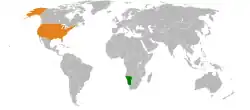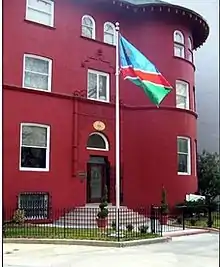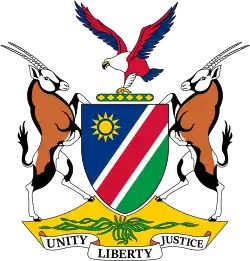Namibia–United States relations
Namibia – United States relations are bilateral relations between Namibia and the United States.
 | |
Namibia |
United States |
|---|---|
History
During the South African Border War, the United States mediated in bringing to fruition the Tripartite Accord which committed to a withdrawal of Cuban and South African military personnel from Angola and South West Africa (present-day Namibia) respectively. The United States recognized Namibia on 21 March 1990 soon after obtaining independence from South Africa. The U.S. Liaison Office at Windhoek was elevated to an embassy.[1]
Relations between both nations are friendly. The United States participated in the diplomatic efforts to bring about Namibia’s 1990 independence from South Africa and has since worked to strengthen political, economic, and people-to-people ties. The bilateral relationship is characterized by a shared commitment to democratic principles, including the rule of law, respect for human rights, independence of the judiciary, and freedom of the press. The United States and Namibia are partners in the effort to combat HIV/AIDS, stem wildlife trafficking and promote conservation, and expand trade and development opportunities.[2]
Resident diplomatic missions

- Namibia has an embassy in Washington, D.C.[3]
- United States has an embassy in Windhoek.[4]
References
![]() This article incorporates public domain material from U.S. Bilateral Relations Fact Sheets. United States Department of State.
This article incorporates public domain material from U.S. Bilateral Relations Fact Sheets. United States Department of State.
Further reading
- Davies, J. E. Constructive Engagement? Chester Crocker and American Policy in South Africa, Namibia and Angola 1981-1988 (2008)
- Mitchell, Nancy. Jimmy Carter in Africa: Race and the Cold War (Stanford UP, 2016), 913pp. excerpt
External links
- History of Namibia - U.S. relations
- US Policy on Namibia from the Dean Peter Krogh Foreign Affairs Digital Archives
![]() Media related to Relations of Namibia and the United States at Wikimedia Commons
Media related to Relations of Namibia and the United States at Wikimedia Commons
